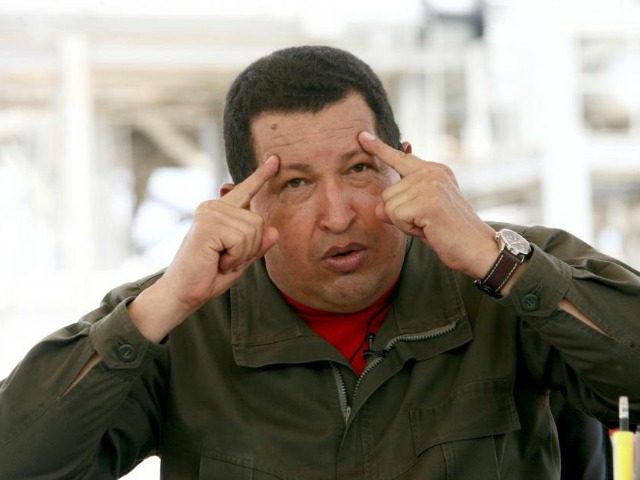The Brazilian magazine Veja has published what it claims to be an official Venezuelan government document authorizing the purchase of multiple chemicals used to make weapons from the government of Iran, a violation of UN sanctions, in 2009.
Veja has published excerpts of the document, including what it claims to be the signature of late dictator Hugo Chávez, on the document. The document allegedly authorizes the purchase of nitrocellulose, as well as the purchase of several necessary items for the establishment of a gunpowder factory and nitroglycerin production. The document is dated August 3, 2009.
If confirmed to be a real document, Veja’s reporting would prove that Iran was continuing its weapons development long after the United Nations attempted to shut it down. It also proves Venezuela was violating UN sanctions to continue doing business with Iran. Iran’s transgressions in selling chemicals for weapons development to Venezuela suggest the Islamic nation was even more flagrantly in violation of sanctions against it than previously anticipated during the development and subsequent approval of the Joint Comprehensive Plan of Action (the “Iran deal”) in 2015.
Following the signing of the Iran deal, which will allow the nation to continue its nuclear development in a decade or sooner, the nation’s Supreme Leader Ayatollah Khamenei issued a statement declaring that the United States had “surrendered” to Iran. The deal has been widely criticized for providing Iran a pathway to a nuclear weapon, an existential threat to neighboring Israel, as Iran’s leaders have repeatedly asserted their will to destroy the nation.
Venezuela’s ties to Iran are currently in the spotlight as Iranian Foreign Minister Mohammed Javad Zarif is making his way through Latin America. On Saturday, Zarif met with high-level officials in Caracas, where his Venezuelan counterpart Delcy Rodríguez praised Iran as a “friendly brother nation.”
“Iran and Venezuela have very good, warm, and friendly relations with independent politics and the people’s resistance in both nations,” Zarif is quoted in official Venezuelan media as stating. “This wide-ranging relationship consolidated by economic cooperation has been confirmed and can continue to consolidate and deepen,” he added.
Iran’s Mehr News reported the exchange as positively as Venezuelan television did. “Iran’s FM pointed to the warm and intimate relations between the two countries, adding Iran and Venezuela seek an independence spirit and resistance which could be developed into even more deeper and strategic policies in future,” Mehr reported.
The Veja weapons report is the latest in a string of similar revelations regarding illegal joint activity between Venezuela and Iran and its terror proxies. Both American academic experts and officials within the U.S. government have warned that Iran and Hezbollah have greatly expanded their footprints in the region. “Iran sponsors terrorism in Latin America by supporting Hezbollah and other terrorist groups through its various embassies throughout the region,” Center for a Secure Free Society (SFS) executive director Joseph Humire said this week: “Iran’s embassies in Latin America function more as intelligence centers than diplomatic outposts, which provide command and control over some of the Hezbollah networks in the region.”
Venezuela’s embassies in the Middle East, meanwhile, have reportedly been operating as document-falsification networks for years. Multiple reports in the past two years have accused Venezuela of printing false birth certificates, passports, and other essential documents for Hezbollah members, allowing them to travel more freely through the Western Hemisphere. According to the 2015 book Boomerang Chávez, current Venezuelan President Nicolás Maduro met Hezbollah leader Hassan Nasrallah in Damascus in 2007, in his capacity as minister of Foreign Affairs, to secure a deal involving drug trafficking and a false passport scheme. The book corroborated 2014 reports that among those provided a false Venezuelan passport was Suleiman Ghani Abdul Waked, Nasrallah’s close confidante.
Subsequent reports accused the Cuban government of providing impoverished Venezuela the funding necessary to print the passports.
Among the more compelling was a video surfacing on social media by a man identifying himself as Misael López Soto, a diplomat at Venezuela’s Baghdad embassy. In the video, López Soto says he has fled the embassy following the receipt of multiple death threats because he contacted Caracas in an attempt to stop the continuous falsification of documents for Middle Eastern terror-linked nationals.

COMMENTS
Please let us know if you're having issues with commenting.